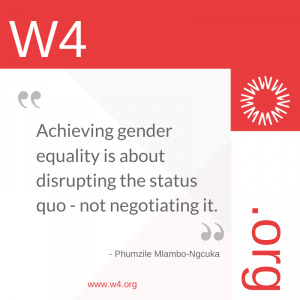Meet W4 team member Sterenn!
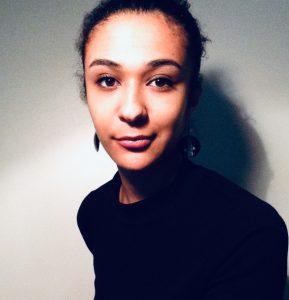
How long have you worked with W4, and in what position?
I’ve been working with W4 for almost a year now, and I’ve almost finished my mission as assistant field program manager in Kenya, where I have been working in Kajiado. I’m currently at our office in Paris, but I’ll soon be heading back to Africa to oversee our field programs in Kenya, Tanzania and the wider Sub-Saharan Africa region.
Why did you decide to join W4?
After completing my master’s degree in African Studies, I seized the opportunity to travel to Kenya to work in W4’s training center in Kajiado, which provides young Maasai women with access to IT & entrepreneurship training. It made a lot of sense for me to work with W4 in Kenya because I wanted to work in the field of women’s rights and, ideally, “in the field” in Africa.
What do you consider to be some of the biggest challenges facing girls and women around the world (or in a specific country or region, for example, where you work) in terms of the exercise of their human rights and their empowerment?
There are many areas in the world where women and girls are not seen as equal human beings. In Kajiado, for example, girls and women face multiple barriers to the fulfillment of their rights, such as early marriage and female genital mutilation. Girls and women struggle to make their voices heard in the community. Most of the students in W4’s training program are girls and young women who are at risk of early marriage, particularly after they finish high school (if they finish high school). They lack the financial means to pursue further education. It’s often at this point that their parents will marry off their daughters, and the girls are not able to defend themselves. Of course, it’s not just in countries like Kenya that women and girls still face the violation of their rights. In France, for example, the “Nous Toutes” movement is working to stop violence against women, which remains alarmingly widespread. In my opinion, girls and women still struggle to make their voices heard and to fully exercise their rights almost everywhere in the world.
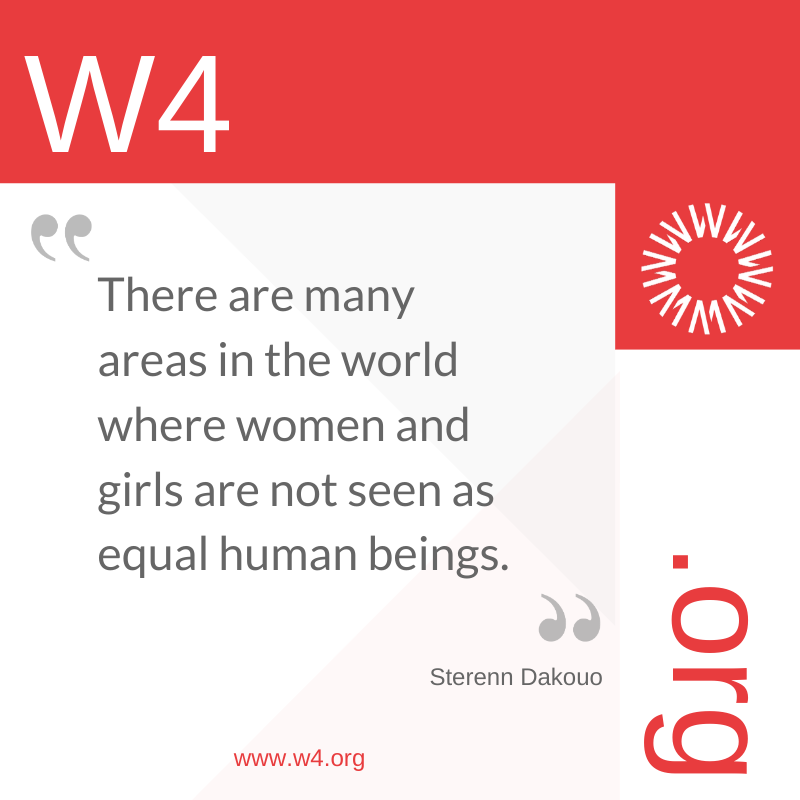
What role do you think W4 plays in eliminating these barriers and promoting women’s empowerment?
W4 is doing an amazing job around the world. The organization runs and funds grassroots women’s empowerment programs, like our training program in Kajiado. The Kajiado program focuses on IT training and entrepreneurship, and is free of charge. It serves girls and women from underprivileged communities and is the only program of its kind in Kajiado county. The girls and women who study at the center are able to gain new skills and qualifications and develop their self-confidence. The program helps to equip the students with the skills and knowledge they need to determine their own futures, to shape their lives according to their own values, to discover and pursue what they truly want in life. For me, that’s empowerment.
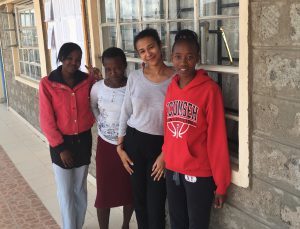
What has been the most challenging part of working with W4? And the most rewarding?
The program in Kajiado is not an easy program to manage. Students come from remote, rural areas and invariably from poor backgrounds. One of the main challenges is that the girls’ parents don’t see the value in their daughters pursuing further education: parents often consider it a burden on the family. Also, the girls and young women have to travel long distances to attend the program at the center, and this itself can be expensive. So, it’s hard for them. It can be challenging. A key part of my job was to try to ensure that the girls stayed in the program. Despite the positive impact that education can have on these girls’ and young women’s lives, and no matter how much support we provide to students, sometimes it’s just not enough to ensure that the girls succeed. I remember when a brilliant student had to drop out of the training program because she had to find a job to support her mother and siblings. She had no choice. Another young student, about 23 years old, suffered bad back problems and this disrupted her studies. It’s very common in Maasailand for girls and young women to have back problems because they are often obliged to help with strenuous housework and carry heavy loads. Now this young woman will have chronic back pain for the rest of her life. It’s very frustrating and saddening to observe these harsh realities.
The most rewarding part of my work is when things go well and the students succeed. It is wonderful to see them learn, grow and gain self-confidence, especially as it’s an achievement that has been far from easy for them, given their environment and the obstacles they face. And when you see a slight shift in mindsets (because a shift in mindset is truly needed), that’s a great sign that they’re on the path to truly believing in themselves.
What are some of the most valuable things you have learned while working for W4?
I have learned so much from W4 and from Lindsey. It’s a great professional experience. I’ve found my vocation, and I’d like to continue working in the domains of women’s rights and women’s empowerment. I find meaning in my work with W4, and I think that’s one of the most valuable things you can have in a job.
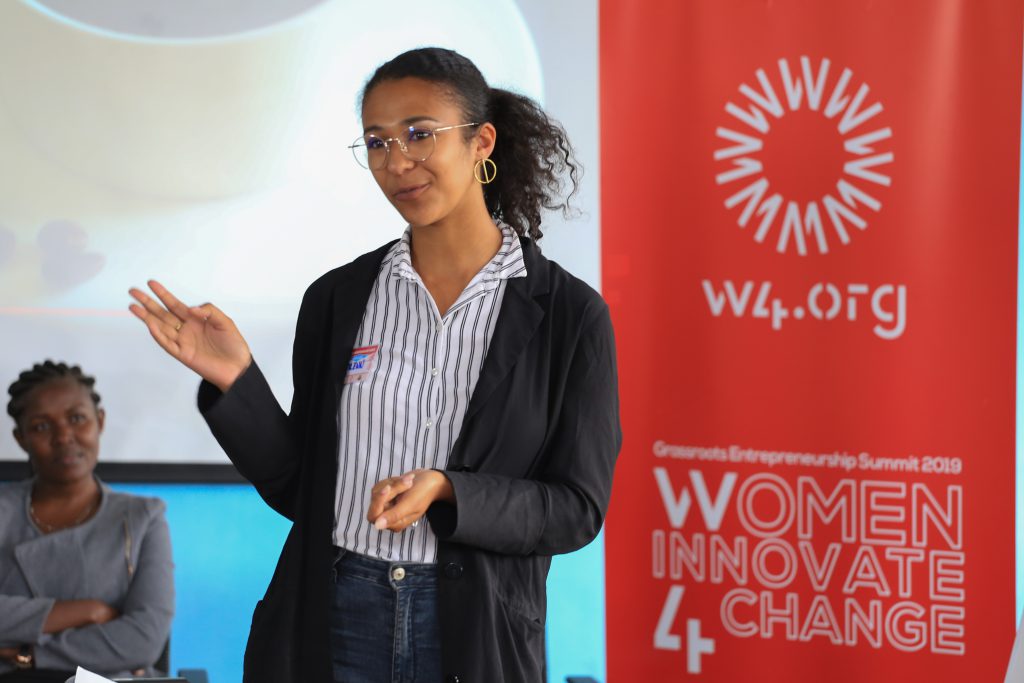
Why would you encourage people to support W4?
I would encourage anyone who is interested in women’s rights and women’s empowerment to explore W4’s various programs. W4 is collaborative and it works at the local level. Wherever we work, we always work with local organizations and local communities (“community-driven development”). I believe this is one of the most effective ways to guarantee a concrete, positive impact on people’s lives at the local community level. I’d also say that people should support W4’s work because we’re doing a great job!
What advice would you give to individuals who are interested in working with W4 and/or other NGOs working in a similar field?
In my opinion, it’s essential to get first-hand experience working abroad. It’s also very important to work with an NGO whose values are aligned with yours. There are all sorts of NGOs working in a variety of fields (the environment, women’s empowerment, etc.) In development work, if your job is aligned with your values, it can be profoundly satisfying and fulfilling.
What are your plans and goals for the future?
In the immediate term, I will continue to work with W4 to help manage and develop our various programs in Africa. I’m not yet sure about my longer term plans, but I know I want to continue working in the domain of women’s empowerment.
Can you share a quote with us that you find particularly inspiring?
Yes, as Phumzile Mlambo Ngcuka has famously said:
